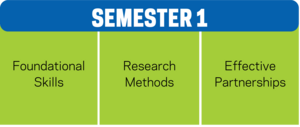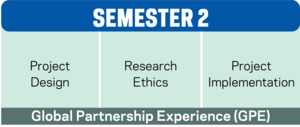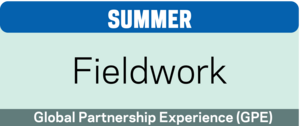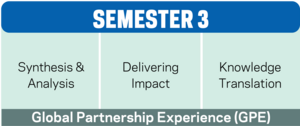Highlights of the i-Lab curriculum
The University of Notre Dame Keough School’s Integration Lab helps NGOs, corporations, and federal agencies innovate by collecting, synthesizing, and leveraging data to improve decision-making on a variety of issues.
Leaders at every level need the best available information relevant to the problems they’re trying to solve—and the i-Lab provides that information through rigorous, accessible, and usable research. The process trains students how to work in diverse teams to accelerate evidence to impact and deliver more effective policies and programs.
The i-Lab curriculum is designed in keeping with the following characteristics of the Keough School of Global Affairs experience:
- Unique opportunities to explore diverse career pathways by engaging in hands-on experiences necessitating adaptability, creative problem-solving, and use of cutting-edge analytical tools
- A learning-by-doing approach allowing students to work at the front lines of today’s most pressing challenges while developing competencies related to global development careers.
- A robust understanding of integral human development preparing students to become exceptional global development practitioners driven to create effective, cooperative partnerships.
i-Lab students work in small teams with a faculty advisor, allowing mentorship to take root while providing ample learning and growth opportunities. Each i-Lab team partners with an organization in the second semester to develop a research proposal. This collaborative process leads to summer fieldwork, where teams engage with stakeholders in various locations worldwide before returning to campus to synthesize, package, and present their findings.
Curriculum Overview
Course Organization

Designed for MGA students in the Sustainable Development and Governance and Policy concentrations, the course comprises three interrelated modules. The first module introduces foundational skills for innovative approaches to address complex global challenges through the lens of systems thinking. The second module engages research methods theory and practice, including developing a research question, choosing appropriate research methods, and knowledge management. The third module explores building effective partnerships, cultural humility, and accompaniment, especially in the context of their upcoming year-long i-Lab Global Partner Experience (GPE).
Semester 1 | Innovative Approaches

The i-Lab prepares students to solve complex problems and engage with multiple stakeholders, including teammates, partner organizations, and the communities they seek to impact and serve. The i-Lab demonstrates how systems thinking, research design, and effective partnerships provide mindsets and skills to support an accompaniment-based approach.
Semester 2 | Preparing for the Field

Interdisciplinary teamwork is increasingly prevalent as students prepare to respond to an identified challenge as part of their GPE under the direction of an i-Lab advisor. This semester, students will engage in ongoing dialogue with their Global Partner to build a mutually beneficial relationship through online workshops. The i-Lab team complements these engagements with additional information, assets, expertise, and methodologies.
A culminating event is the GPE Proposal, which simulates the professional grant writing process. Through the GPE Proposal, students will frame their global challenge, the rationale for the approach adopted, the objectives of their fieldwork, methodologies to be employed, significant activities to be undertaken, project milestones, timeline, and budget. The proposal will be drafted in multiple stages over the semester and presented to the i-Lab team to replicate the evaluation and feedback processes associated with a funding agency’s Request for Proposals (RFP). All students will submit a Human Subjects Protocol to Notre Dame’s Institutional Review Board (IRB) to ensure proposals are ethically sound. To verify that the proposal is actionable, students will also prepare an Implementation Plan to guide the execution of the project in the field.
The course helps students develop essential skill sets and critical mindsets by integrating knowledge from different disciplines to prepare for the GPE. It also enables deep learning about the context, place, and opportunity posed by their partner.
Summer | Engaging in the Field

Semester 3 | Analysis and Strategy

This third i-Lab course supports students at the close of their practicum experience, specifically through the preparation of a packaged deliverable founded on the analysis and synthesis of literature, data, and observations gathered over the summer. Through the deliverable, students will communicate what they have learned from their summer experience.
Over the course of the semester, the team will benefit from multiple internal and external feedback loops to ensure deliverables are meeting the expectations of all parties. For i-Lab student teams working with a partner, the deliverables will be formally transferred to the Global Partner Liaison at the close of the calendar year and permanently archived by the i-Lab, marking the end of the Global Partner Experience.
